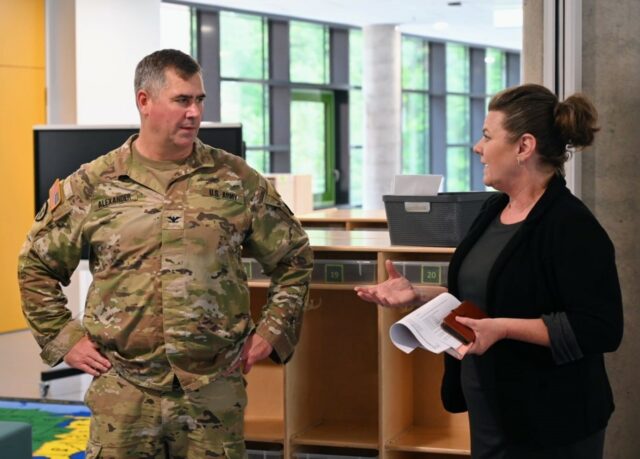
By USAG Stuttgart Public Affairs Office
Leaders from U.S. Army Garrison Stuttgart and the Dept. of Defense Education Activity (DoDEA) are sharing information on how they will address instances of hot weather once school resumes later this month.
Garrison Commander Col. Kirk Alexander and DoDEA Europe East District Superintendent Elizabeth Fales met Thursday at Patch Elementary School to discuss operations in warm weather during the upcoming school year. That subject has been on the mind of some parents who felt the building at Patch got too warm at the beginning of school last year.
“For the upcoming school year, anytime the outside temperature is forecast to reach 85 degrees or high, we will begin conversations with DoDEA on appropriate response measures to ensure safety of students,” said Alexander.
DoDEA has developed procedures for ensuring early communications with garrison officials in the event of hot weather, similar to the process they undertake for winter weather. DoDEA and garrison public affairs teams have been instructed to share information with the community as quickly as it becomes available.
“The safety and well-being of our students and staff are our top priorities,” said Fales. “With extreme heat becoming more routine, we have to implement comprehensive measures to ensure a safe and comfortable learning environment.”
A key feature at Patch Elementary School is its air ventilation system. According to DoDEA, the system continuously exchanges indoor air with fresh outdoor air.
“The Sergeant Major and I walked through the Patch school in late July when the temperature was 88 degrees outside,” said Alexander. “The system was working as designed.”
Additional measures to be implemented by staff include deployment of semi-industrial fans to all neighborhoods in the school and closing roladens during the warmest part of the day.
“We have been closely monitoring performance of the system in the school,” said Fales. “We have partnered with Industrial Health to verify the system sensors are accurately reporting temperatures to the main control. These tests confirmed the system is functioning properly.
DoDEA plans to share additional information during the back-to-school communications efforts.
